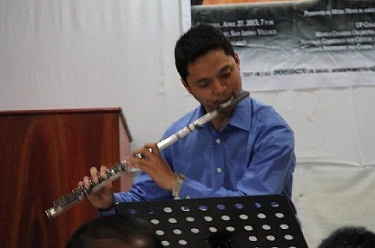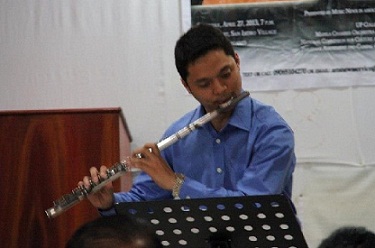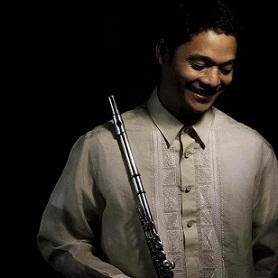By PABLO A. TARIMAN
IN this intimate concert at the UP Abelardo Hall, the audience was still in a trance after listening to baritone Noel Azcona’s interpretation of Ibert’s art songs.
When flutist John Raymond Sarreal came in for Chaminade’s Concertino, Op. 107, there was another hush in the audience as a refreshing melody all but showcased the best in that French repertoire.
The rapport with pianist Najib Ismail was perfect, the flutist looked like he was enjoying every minute of it and at the end of the Chaminade number, there was loud cheering and applause fit for a rock star.
“I really had such a fantastic time playing to cheering audiences,” he said. “I heard a lot of ‘Bravos!’ and loud clapping. It’s an amazing feeling for any artists to be appreciated for his efforts.”
A week later, the same ecstatic response was repeated in the closing concert of the 2013 Catanduanes Summer Music Festival at the Kemji Resort in Virac, Catanduanes. “I guess they reacted the same as the UP Abelardo Hall audience. Indeed I had such a fantastic time. I really felt people enjoyed our playing.”
A recent bachelor’s degree holder in music at the UP College of Music where he studied under Eric Barcelo and Antonio Maigue, Sarreal was many times a prizewinner of the National Music Competition for Young Artists (NAMCYA). He has just passed the auditions for prospective members of the Rome Music Festival Orchestra in Italy.
“Just like in any audition, I prepared really hard for it. I make sure that I would play the best of my ability. The audition was via CD recording and just played my best. It was a great feeling to receive the acceptance letter from them,” he said.
Surprisingly, Sarreal comes from parents who are music lovers but not professional musicians. He confessed he fell in love with the flute sound from watching the cartoon, “Cedie The Little Prince.” The tone and the character hooked him.
 With this family background, it is another mild surprise to discover that the six members of the family including him are all into music. The eldest, Roberto, plays the sax, clarinet and flute; brother Guido plays the trumpet, Jacob on sax and clarinet, sister Agnes on trumpet and a singing actress and youngest sister Angelie on clarinet.
With this family background, it is another mild surprise to discover that the six members of the family including him are all into music. The eldest, Roberto, plays the sax, clarinet and flute; brother Guido plays the trumpet, Jacob on sax and clarinet, sister Agnes on trumpet and a singing actress and youngest sister Angelie on clarinet.
“Our parents are very proud of us,” Raymond rued. “We usually play in a lot of family gatherings and they invite them to our shows and concerts.”
As for Raymond, he started music-making at age 6. “Since I was a very small, my hands and arms were too small to hold a flute so I started playing the recorder. Then at age 7 after growing a bit bigger, I started to shift to the flute. I couldn’t remember much about my first teacher except that he always praised the good things I have done. I was so interested in music that’s why I practice hard and he would commend me on that. My idea of a good teacher is someone who keeps on learning new things and some who updates me on the music world and someone who will give everything he knows to his student. I’m lucky to have a teacher like that.”
Winning his first competition at age nine, Raymond has no idea what he went through. “My first every flute teacher, Mr.Edgardo Silangcruz, prepared me for my first NAMCYA competitions. I really didn’t have an idea what a competition is since I was 9 years old then. I just played in front of smiling audiences. I really didn’t know the impact I did on people. But I remember having a great feeling on winning. Since then, I always wanted to win because it really felt good.”
Why the flute among other instruments?
“The flute could produce a lot of tone colors that can make music very interesting. From dark and dull sound to a bright sound. You could play various dynamic levels in the instrument. The flute could sound mysterious and sometimes you could make it sound very lovely.”
But sounding the way he did in the last two concerts in Manila and in Catanduanes was no pure luck. He worked hard at it even as he has other interests outside of music like investing in the stock market, reading books, playing basketball, meeting new people, attending seminars to – in his own words –learn something new.
Indeed, he practices two to three hours every day. “It takes so much hard work to be a great flutist or even a musician. You should have a good foundation in your sound, technique, breathing, intonation, musicality, interpretation of the piece, ensemble playing. So much work and I have to work on them every single day. They say that the flute is one of the easiest instruments to learn. It’s easy to make it sound but hard to make the notes sound on the instrument. One of the most difficult things to master in the flute is intonation. A lot of conductors complain about the intonation of the flute.”
Preparation, he admits, is only one of several keys to a good performance. He needs good mentors and friends who are willing to help. “If I know I have worked hard for a concert, I have a lot of fun performing.You should really have a game plan to be able to do well.”

